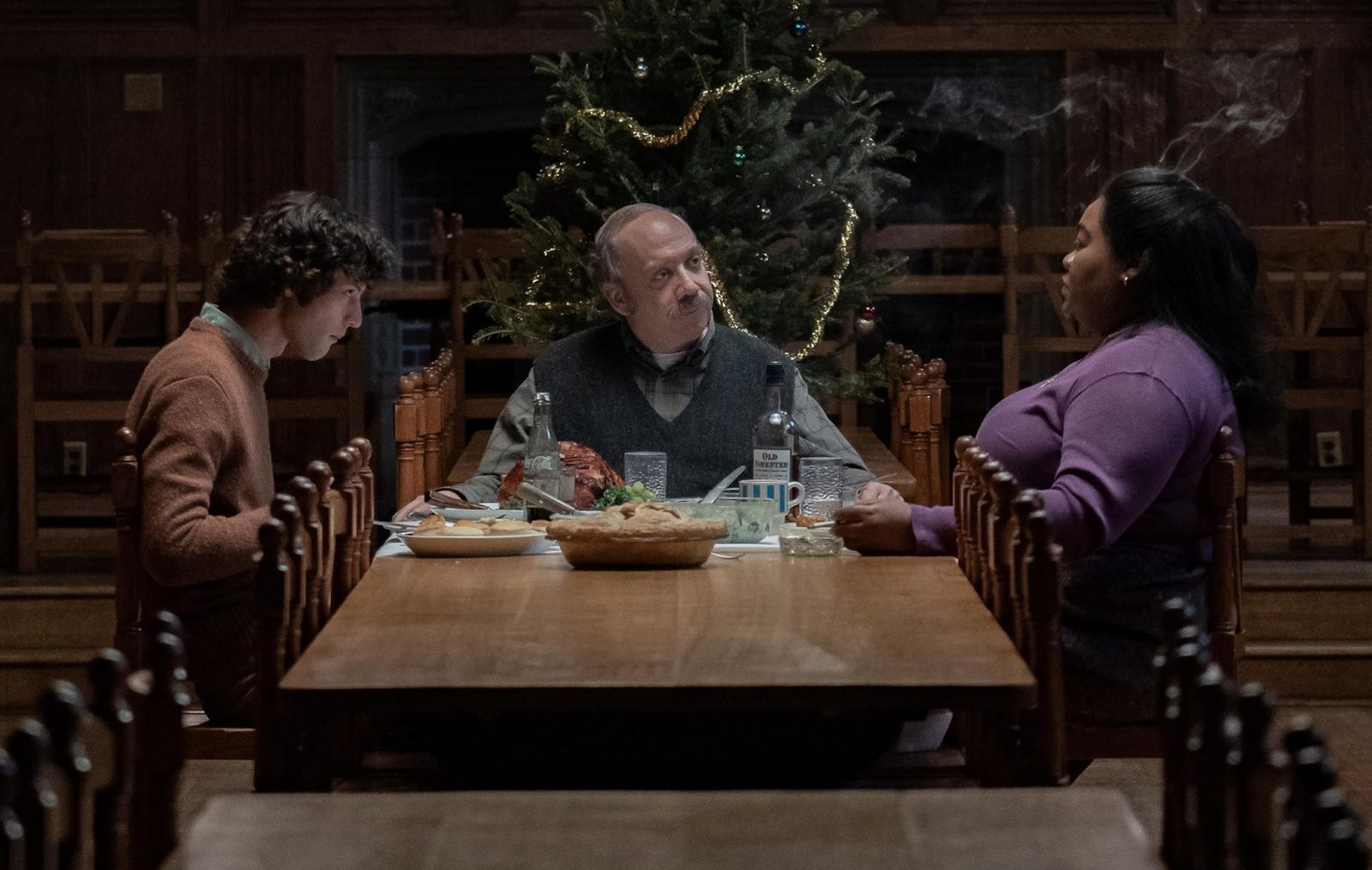‘The Holdovers’ (2023): Alexander Payne’s Unlikely Successor to ‘Dead Poets Society’

“O Captain! My Captain.” The iconic Walt Whitman quote frequently repeated throughout Peter Weir’s boyhood classic, “Dead Poets Society” (1989), rang in my head as I sat down to watch director Alexander Payne’s newest film this past week, “The Holdovers.”
Much like “Dead Poets Society,” “The Holdovers” is also a period film focused on a teenage boy’s experience at a Catholic, all-boys boarding school in New England. It too explores the overarching themes of adolescent angst, isolation and self-loathing that accompanies any teenage boy stuck in a rigid school system. But perhaps the final nail in the coffin of their comparison is the complex and emotionally significant relationship between its leading teenage boy and his teacher.
Set in December 1970 at the fictional Barton Academy — somewhere in the realm of New England — “The Holdovers” follows the young and bitter Angus Tully (Dominic Sessa), who has just been deserted by his mother and stepfather right before the holidays. Angus must join the ranks of Barton Academy’s most dreaded group of students — the holdovers; the students who, for whatever reason, are left behind at school over the Christmas holidays. The teacher bestowed with the unwanted task of monitoring the group is the curmudgeonly Mr. Paul Hunham, whose goal is to teach these unsuccessful and rebellious boys a sense of discipline long lost on these troublemakers.
Playing the role of the uncompromising and authoritarian history teacher is Paul Giamatti, whose lazy eye and pronounced frown linger on the screen for an uncomfortably long duration of time. Differing greatly from Robin Williams’ soft-spoken and nurturing portrayal of teacher John Keating in “Dead Poets Society,” Hunham gives his students nothing but contempt and vindictive punishments. His unbridled vitriol towards the students serves as the central conflict of the film, causing issue after issue with the scornful and homesick boys. But as luck would have it, one by one, the boys are picked up and taken back home as the winter break unfurls. Unfortunately for Angus, his calls to his mother go unanswered, and tensions mount with Mr. Hunham as he becomes the last remaining student under his watch.
Through a shared sense of loneliness and personal failure, the boy and his teacher begin to form a reluctant alliance, a mutual respect for the other as they quietly combat their respective struggles with emotional intimacy and healthy relationships. Aiding their journey towards betterment and survival of the miserable break is head chef at Barton, Mary. Perhaps the only emotionally mature character, Mary helps foster the two boys’ relationship by providing a much-needed reality check, serving as the catalyst for the emotional reckoning between the two by showing them how similar they really are.
While the film could be classified as a holiday movie given its setting and time, the label does not do it justice. Payne’s work is not a feel-good Christmas movie, but rather a profoundly philosophical examination of loneliness, abandonment and self-condemnation. Both the restless Angus and the scornful Mr. Hunham soften as they begin to see how much they mirror one another, just two odd and dejected males struggling to make sense of a world that does not care for them.
While their sentimental connection veers into a saccharine tone at times with its overly cheesy one-liners and watered-down moments of dialogue, the heart of the narrative more than makes up for it. Both Payne’s acute attention to historical detail and the organic connection carried by acting veteran Giamatti and newcomer Sessa, champion the plot. Their generational tension is palpable, providing its audience with a very visceral sense of their opposition and the ebbs and flows of such contrasting personalities working to learn from one another.
While less focused on the concept of brotherhood, as witnessed in “Dead Poets Society,” through its protagonist Todd and his fellow boarding school peers, Payne instead chooses to highlight another crucial aspect of boyhood: making peace with those in authority over you, particularly those you deem difficult. Why? Because in all likelihood, they mirror your future self, giving you a terrifying glimpse of what’s to come.
This nearly Charles Dickensian life lesson does not just apply to the youthful hero of this story but, maybe even more importantly, also to its chief elder. In the very same manner of Mr. Keating in “Dead Poets Society,” we watch Mr. Hunham wrestle with his role as teacher and mentor, conflicted over his obligations to academic duty and moral principle. Hunham, too, was a student at Barton Academy, clinging onto his staff position there as some sort of lifeline to the past, to all that made his life promising.
The failure to amount to his dreams of esteemed academia beyond the four walls of Barton and into the real world is the sole motivator behind Hunham’s snark and self-loathing, but it’s the troubled, teenage Angus who unexpectedly pulls back these layers and teaches him a lesson in vulnerability and self-integrity. In turn, Angus opens himself up to the prospect of allyship and a true friend in Mr. Hunham. And as we see in Hunham’s final act as teacher and mentor to Angus, his arrogance and hubris is gone; all that remains is a fierce loyalty and selflessness neither ever knew they were capable of. Angus has his Captain, at long last.
